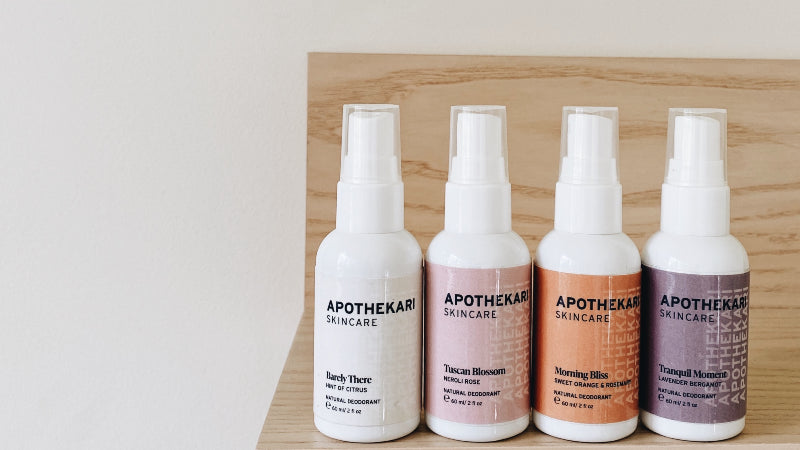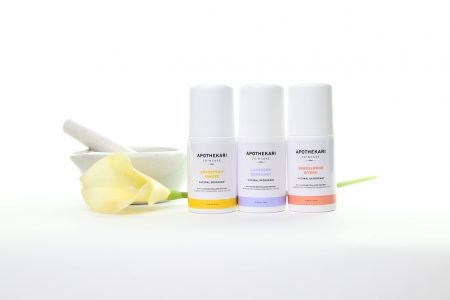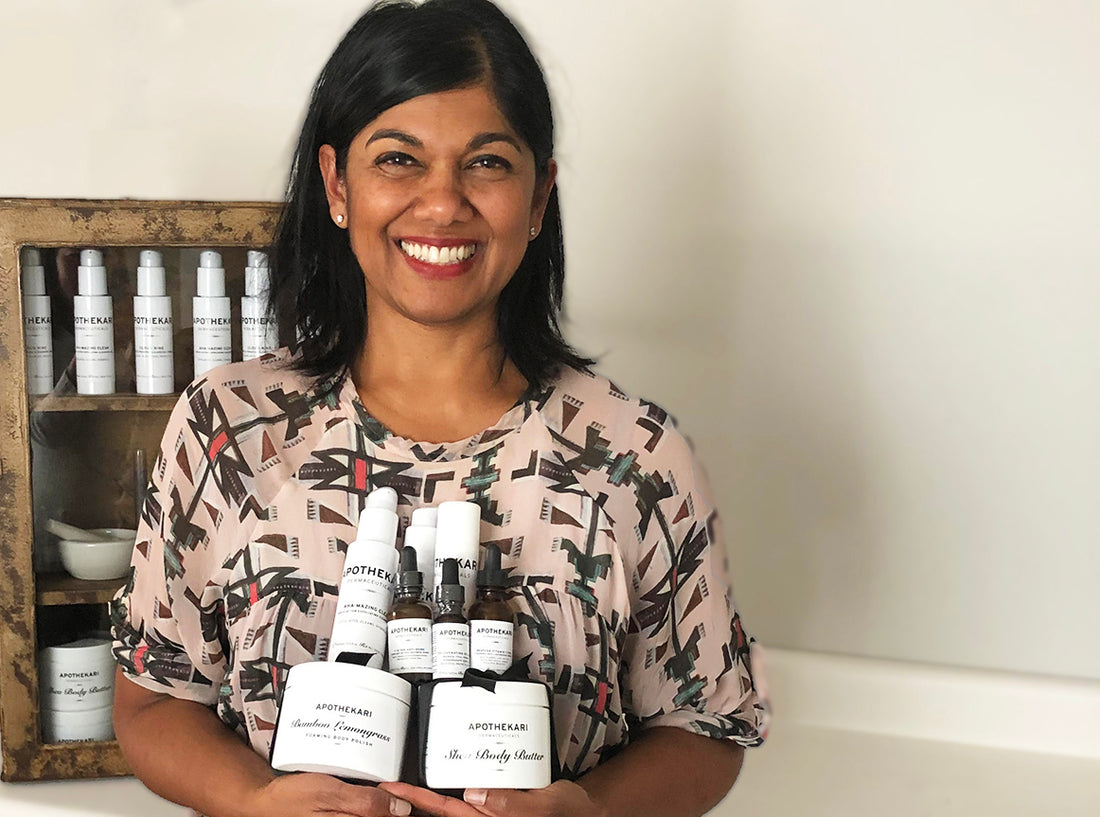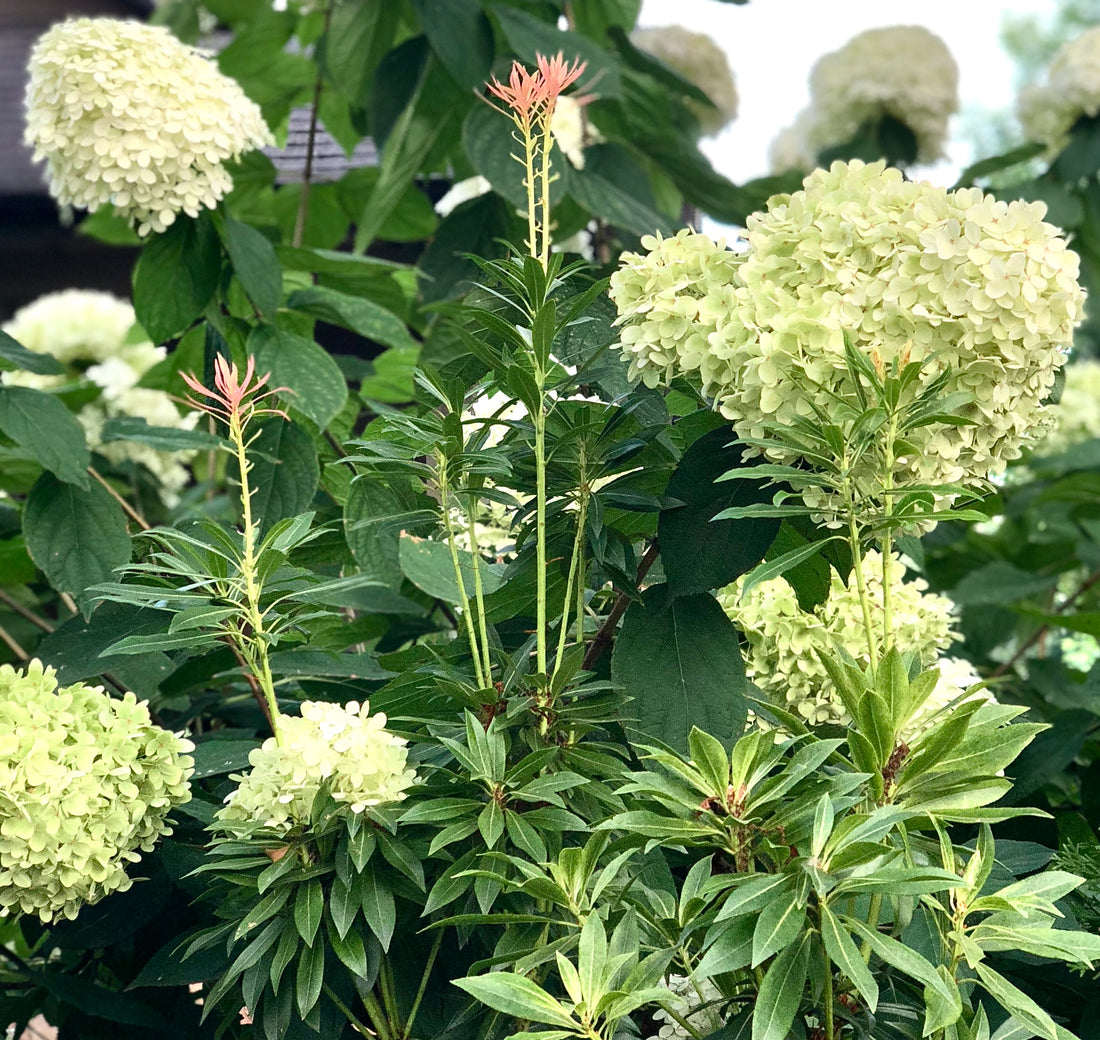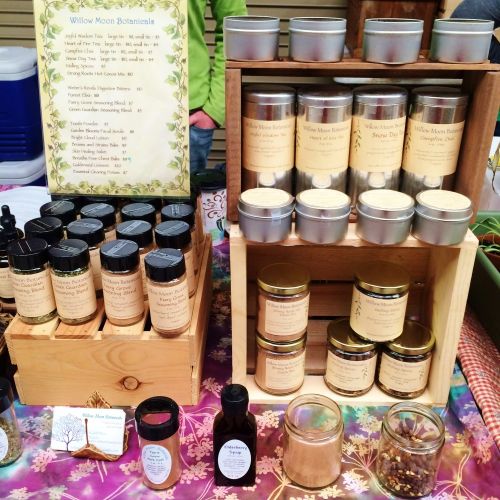Blog
Everything You Wanted to Know About Natural Deodorant. And How to Choose the Right One
Curious about making the switch to natural deodorant? Or wondering if using one is right for you? You’ve come to the right place. In this post, we’re answering alllll the questions you may have about natural deodorant and finding one that’s right for you. Landing upon a deodorant that actually works–trust us, we’ve been through the process of trial and error–can seem as hard as finding the proverbial needle in the haystack. Ones that manage to control odor, effectively, are few and far between. Not to toot our own horn, but Apothekari’s natural deodorants do. Q: Does Natural Deodorant Work? If you’ve already been on a hunt to find the perfect deodorant, then we feel your pain. Hard as rock crystals that tug at your skin, sticky globs that drip down your arms and oil based ointments that stain your shirts. Not only are they messy, inconvenient and mean to your clothes, many of them just don’t work. We were about to give up too, until we decided that if the perfect deodorant didn’t exist, that we’d create our own. One that really works! Apothekari’s new spray deodorants rely on a triple combination of odor destroying ingredients that stop the stench: Natural odor eating enzymes that break down the stinky stuff in sweat so that you won’t smell Probiotics to help increase the concentration of good bacteria on your skin, which attacks the bad bacteria that leads to odor Glycolic acid, which keeps skin at a friendly pH and inhibits the production of the smell inducing bad bacteria. Plus we’ve included soothing allantoin and caffeine to ensure that your pits not only smell fresh, but feel soft and smooth too. Is It Safe to Use Natural Deodorant? Natural deodorants differ from antiperspirants because they are free from aluminum, the ingredient that stops sweat–and the ensuing odor–from developing. Instead, they rely on ingredients that can do one of several things: Absorb wetness (arrowroot powder, cornstarch) Increase or decrease skin pH to make it inhospitable to odor causing bacteria (baking soda, glycolic acid) Antibacterial properties (tea tree and other essential oils) Act as probiotics (ethylhexylglycerin). Most of the ingredients are safe (except for baking soda, whose high pH can lead to skin irritation and rashes and which we’d never recommend in deodorant) and well tolerated by most individuals who use them. When/How Often Should I Apply the Deodorant? Apply deodorant after showering or bathing, to your pits, feet or anywhere else on your body that needs some freshening up. Since we’re all different, use how much you sweat as a gauge. You may want to reapply before physical exercise or when heading out for the evening. It’s safe to use our deodorants more than once in a day. Do You Sweat More With Natural Deodorant? Yes, you will sweat more with natural deodorant compared to an antiperspirant. Antiperspirants minimize sweating, while deodorants works to control odor and have no impact on the amount of sweat. Is It a Gimmick? Well formulated deodorants actually deliver on their promise of controlling odor. Keep in mind that a deodorant isn’t an antiperspirant, so they won’t stop the sweat, but if they are made with the right ingredients, then they will help to keep you smelling fresh. Q: Antiperspirant vs Natural Deodorant Antiperspirants work by blocking sweat glands, reducing the amount of sweat that reaches the skin’s surface. The bacteria that live on your skin don’t have any sweat to break down so the odor causing by-products are not produced. Natural deodorant doesn’t reduce sweat, but prevents odor with ingredients that reduce the odor causing bacteria and/or by masking it with scent. While many natural deodorants rely on baking soda to help reduce bacteria by increasing the skin’s pH to 8-9; we use glycolic acid, instead, which helps skin to stay within it’s ideal pH, and minimizes the risk for irritation. What is the Most Effective All Natural Deodorant? The most effective deodorant is one that’s right for you. Although there are some ingredients known to help control odor (we listed a few above), not every deodorant works for every person. It’s a matter of body chemistry, individuality and the formulation itself. You may need to try a few deodorants before you find one that’s right for you. But we can tell you that the majority of people who use our deodorants, have nothing but positive things to say about it! But you don’t have to trust us; check out the testimonials on our pages. Q: What is the Healthiest Natural Deodorant? There isn’t just one deodorant that can claim to be the healthiest, but there are certain things to look for when choosing a healthy deodorant. pH Balance. pH is a scale that ranges from 0 to 14 and measures the acidity or alkalinity of a substance. High pH (14) means alkaline and low pH (0) is acidic. pH 7 is considered neutral. Your skin is naturally acidic, sitting somewhere between 4.5-6.5 and covered by a fine layer called the ‘acid mantle’. This layer helps to keep skin healthy, locking moisture in, and offering protection against harmful substances, including bacteria. It’s important to maintain this level to enable the ‘acid mantle’, the fine layer that sits on top of our skin, to function properly, retaining moisture and keeping germs out as well. If the pH is disturbed often or for a long period of time, your skin can become very unhappy. It’s why we avoid baking soda (or magnesium hydroxide) in our formulations. These high pH substances–greater than pH 8 or 9, may work initially, but over time, can lead to itching and irritation including rashes and even chemical burns. Apothekari’s natural deodorants are free from baking soda; the slightly acidic pH means happy skin. Aluminum Free. Aluminum is the key ingredient in antiperspirants and works by plugging sweat glands to prevent sweat, and the ensuing odor. And while you may be concerned about the link between aluminum and Alzheimer’s Disease or breast cancer, studies have disputed that they’re connected when it comes to your health. But it’s not without its downsides. Aluminum is the ingredient that stains clothes yellow. And, it can irritate skin in sensitive individuals so, for these reasons, you may want to avoid it. CAVEAT: Many deodorants claim to be aluminum free yet may contain kaolin clay (chemical formula Al2Si2O5(OH)4, or aluminum and silica). If you’re trying to avoid aluminum, don’t make the mistake of choosing one with kaolin clay. Our deodorants don’t contain any aluminum-containing ingredients. Baking Soda Free. Although it works to control odor, baking soda is a high pH ingredient (see point 1 above) that kills the good bacteria on your skin that keeps it healthy. This disrupts your skin’s natural ecosystem, and over time, can lead to red, itchy and irritated skin. Probiotics. Probiotics work to increase the amount of ‘good bacteria’ that live on your skin. These good bacteria destroy the ‘bad bacteria’ that lead to odor so you’ll definitely want to use a formulation that contains probiotics. Is Baking Soda Harmful in Deodorant? We’ve discussed our concern with baking soda in deodorant above. It may be considered a natural ingredient, but stripping your skin’s natural pH leads to skin irritation. If you’ve tried natural deodorants before and experienced itchy, red or irritated skin, then baking soda is most likely to blame. Our natural deodorants are B.S. free in more than one way! There’s no baking soda in our formulations. Instead, we rely on a combination of odor neutralizing enzymes, probtiotics and glycolic acid to help keep your underarms–and other body parts–smelling fresh and feeling clean all day. Q: What Causes Body Odor? Sweat itself is odorless but when it’s released from either your eccrine glands (over most of your body) or apocrine glands (hairy areas) it mixes with the bacteria that live on your skin. These bacteria break down certain proteins in your sweat into acids, which lead to body odor. Apocrine sweat, which comes from hairy areas, is higher in protein. And when it’s broken down, it leads to smellier acids. It’s why body odor tends to occur more frequently in your pits and groin. Why Do I Smell Like BO With Natural Deodorant? See the point above. It means that your deodorant just isn’t cutting it. We’ve found that ingredients like coconut oil or a blend of essential oils, which start off smelling pretty, are the worst offenders. Does Natural Deodorant Make Your Armpits Stink? If the formulation you’re using is not effective, then yes you will smell! It won’t be able to effectively fight against odor, leaving you smelling like you’re trying to cover something up. Or worse yet, like a pair of damp, smelly gym socks. Get thee to a new formulation. Have you tried ours? Q: What Deodorants Have No Parabens? Ours have no parabens! Parabens are a class of preservatives that are used in both food and cosmetics to help keep them safe from developing bacteria, mold or fungi, which can be harmful to your health. However, many people are concerned with their safety profile and link to hormone disruption, which harm fertility and reproductive organs, affects birth outcomes, and increases the risk of cancer. While there is little evidence to suggest that parabens actually do any of this, many people wish to avoid parabens in their personal care products. For this reason, Apothekari’s natural deodorants are made without parabens. However, you can be assured that they are preserved properly, to ensure your safety. Q: Can You Just Switch to Natural Deodorant? Yes you can! While antiperspirant plugs the sweat glands to prevent sweat from developing, it is perfectly safe to stop using antiperspirant one day and then start using a natural deodorant the next. Your pits and other body parts will be very happy if you choose the right formulation. However, if you opt for one that contains high pH baking soda or magnesium hydroxide, then you may experience a reaction, including itching or a rash. Despite what you’ve been told, your body is NOT releasing toxins, it is simply reacting to an ingredient (baking soda) that is not good for your skin. If this happens, stop using the product and wait for the reaction to clear up. In some cases, it may not and if it lingers for longer than a 2-3 days, please check in with your doctor. What Happens When You Start Using Natural Deodorant? If you’re changing over from antiperspirant to natural deodorant, the main difference you’ll notice is an increase in sweating. Antiperspirants form plugs to block sweat glands and the odor that follows. Once you stop using an antiperspirant, it can take about a week for these plugs to disappear. The result will be an increase in sweating, but as long as you’re using an effective deodorant formulation, you shouldn’t notice a smell. Natural Deodorant for Men Men and women sweat a bit differently. Men tend to sweat more than women, and their sweat also smells a bit different. However, there’s no reason that they can’t use the same type of natural deodorant as it will work the same way, regardless of your gender. Is It Suitable for Kids/Teenagers? Yes, our deodorant has been formulated for anyone and everyone to use. Is Natural Deodorant Suitable to Use in Pregnancy? Natural deodorants are fine to use during pregnancy. If you have any concerns we advise checking with your healthcare practitioner. FAQ About Apothekari Natural Deodorant If you’re new to our natural deodorant, here are some answers to frequently asked questions and how to use it for optimal efficacy. How Do I Use the Deodorant? Mist 2-3 sprays to underarms, feet, under boobs or groin/underpants. Our deodorants are designed to control body odor and not cover up your natural odor. External use only. How Long Will One Bottle Last? Everyone is different, so it varies depending on how frequently you use it and how much you apply at one time. If you’re using to control odor under your arms only, we find that one bottle lasts between 2-3 months for most people. Prep Your Clothes First! Lingering odors from waxes and oils found in anti-perspirants, natural deodorants, and fabric softeners may be left behind in clothing–causing it to smell even after washing. If this is the case, you may need to treat the clothing first with an enzymatic detergent before washing. Try doing this before tossing in the hamper. Please don’t blame our deodorant if your clothing smells from old odors! Do I Need To Detox Before I Use Your Natural Deodorant? Unlike many other deodorants, you do not need a pit detox with Apothekari. Our natural deodorant is baking-soda free, so you don’t need to worry about developing a rash or burn under your arms, which often happens with baking soda. Baking soda-based deodorants have a high pH (8-9), while your skin is happy at a pH around 5. Our approach respects your skin’s pH and chemistry–ensuring that you won’t experience the irritation often seen with other natural deodorants.
Learn moreSweat Confidently With This Natural Deodorant!
Sweat confidently! Prevent body odor with our new natural deodorant free from aluminum, parabens and baking soda, available in 3 essential oil scents. Shop All Apothekari Natural Deodorants We’ve been working on this product for over 2 years and are very excited to introduce it to you! Formulated with healthy ingredients that respect skin’s natural chemistry, our natural deodorant contains mild, natural and environmentally friendly ingredients, including an enzyme that neutralizes odors caused by perspiration; leaving you smelling fresh all day! Convenient roll-application means no messy hands either. For more information regarding natural deodorant, check out this post, where we’re discussing EVERYTHING you want to know. What Causes Body Odor? If you exercise, when you’re too warm, feeling nervous, anxious or stressed, chances are you’ll sweat. Sweat is released by sweat glands – eccrine (over most of your body) or apocrine (hairy areas) – to help cool your body down. Sweat itself is odorless until it combines with the bacteria that live on your skin, especially in moist areas like your armpits and groin. The bacteria on your skin break down certain proteins in your sweat into acids. This by-product of the bacteria breaking down the sweat is what results in body odor. Sweat produced by apocrine glands (as compared to the eccrine glands) is high in protein, resulting in more smelly acids. It’s the reason why body odor tends to occur more frequently under the armpits and groin. Anti-Perspirant vs Natural Deodorant An anti-perspirant works by blocking sweat ducts, thereby reducing the amount of sweat that reaches the skin’s surface. Bacteria can’t break down the sweat so the odor causing by-products are not produced. Most anti-antiperspirants rely on aluminum salts, which are effective because they stop the sweating that ultimately leads to odor. While there has been speculation that aluminum is linked to breast cancer and Alzheimer’s Disease, the data to support this is weak at best. Aluminum, does however, come with other side effects including skin irritation and that horrible yellowing on the underarms of your white shirts. A natural deodorant, doesn’t reduce sweat, but prevents odor with ingredients that reduce the odor causing bacteria and/or by masking it with scent . Natural deodorants often rely on baking soda to help reduce bacteria by increasing the skin’s pH to 8-9; a range that sits much higher than our skin’s ideal pH, and which can cause irritation. For this reason, our deodorant is free from baking soda. Free From Aluminum, Parabens & Baking Soda Apothekari Natural Deodorant is formulated without irritating baking soda or aluminum salts. This helps to reduce the potential for skin irritation and also means no yellow stains on the underarms of your white shirts! Our formulation contains odor neutralizing enzymes along with lactic acid. This combination helps to prevent body odor, while also conditioning skin and respecting and maintaining the healthy physiological pH of your skin. We offer 3 different essential oil scent blends, to help keep you feeling fresh all day. Like all our products, our natural deodorant is also paraben free and cruelty free. It’s taken us years to perfect this formula and we hope you love it as much as we do! Read more about our philosophy here… Using Apothekari Natural Deodorant & FAQ If you are new to our natural deodorant, here are some answers to frequently asked questions and usage for optimal efficacy: Does Apothekari Natural Deodorant Control Wetness? Our deodorants don’t contain aluminum (which stops perspiration) so we are not an anti-perspirant. You will still sweat, but you won’t smell! How Should I Apply? Give the deodorant container a shake and then roll under each armpit. Allow a few minutes to dry before dressing. How Long Will One Container Last? Everyone is different and much depends on how frequently and how often you apply. With daily roll-on application, we find that one bottle lasts between 2-3 months on average. Prep Your Clothes. Odors can linger from waxes and oils found in anti-perspirants, natural deodorants and fabric softeners. These may be left behind in clothing causing it to smell even after washing. If this is the case, you may need to treat the clothing first with an enzymatic detergent before washing. Try doing this before tossing in the hamper. Please don’t blame our deodorant if your clothing smells! You Do Not Need to Detox! You know those natural deodorants that tell you to detox? Well, unlike those, you do not need a pit detox with Apothekari because our deodorant is baking soda free! Without baking soda, you don’t need to worry about developing a rash or burn under your arms. Baking soda deodorants have a high pH (8-9), which can cause skin irritation. Our skin is happy at a pH around 5 – our approach respects your skin’s pH and chemistry ensuring that you won’t experience the irritation often seen with other natural deodorants.
Learn moreApothekari Skincare : An Indie, Female-Led, Proud Canadian Company!
Based in Vancouver, British Columbia, Apothekari Skincare is an indie, female-owned & operated, proudly Canadian company! We take our inspiration from apothecaries, the precursor of today’s pharmacies, resulting in a modern-day boutique specializing in healthy formulations for skincare. In this post, we’re sharing more about us, including where we’ve come from, what we stand for and where we’re going. Let’s get acquainted! Our Roots I’m Sharmani Pillay, a pharmacist by training and the founder of Apothekari. My career has involved dispensing medicines, counselling patients on their prescriptions and making recommendations for their wellness needs. Nearly 15 years ago, I took that knowledge to open my own business (now PhaMix.com) selling a range of curated wellness and skincare products. It became clear to me that women needed better skincare products and so Apothekari was born. Our formulations are: Naturally safe, without harmful ingredients Effective, containing optimal concentrations of ingredients proven to deliver healthy & beautiful skin. Whether it’s a moisturizer for dry skin, a serum for brightening or a lotion to diminish the appearance of fine lines. Apothekari’s products work as they are intended, without hype and misinformation. We won’t tell you to use products that you don’t need nor will we scare you into using ones that can’t improve your skin. Image: Stabler Leadbeater Apothecary Museum – Alexandria, Virginia We Stand For Wellness Apothekari provides naturally safe products for face and body, but we stand for much more. Skin is our body’s largest organ and it reflects our overall wellness. Optimal care goes beyond just popping a pill or slathering on a cream. We understand the importance of a holistic approach to wellness and embrace self-care, sound nutrition, exercise, quality sleep and stress management to aging well and looking & feeling good. You deserve exceptional products and services, which means attention to detail in every aspect of our operations. Like many entrepreneurs, I wear lots of different hats and am involved in almost everything, including writing all the blog posts, managing social media, taking photos, working with designers and collaborating with chemists on formulations. On any given day, you may also find me answering phone calls, replying to emails and shipping out orders. Each day is different; boredom is a word that doesn’t exist around here! None of this, of course, would be possible without the small team of wonderful women, whom I’m grateful to work with every day. Exciting Developments For This Canadian Company! There’s no good idea that cannot be improved on. Michael Eisner We’ve recently launched new skincare sets and watch for more coming soon. Lots of innovation is going on behind the scenes, with several products in development, some offering unique advantages over others currently available today. We can’t wait to share them with you! Thank you for being part of our journey. Read more about us here.
Learn moreThe Problem with Natural Skincare Products
*Disclaimer – This post is not meant to bash natural skincare products; rather clarify, from a pharmacist’s perspective, what one can expect when seeking out cosmetics marketed as being natural… Although we describe Apothekari as “Scientific Skin Care”, we could easily justify calling it a natural skincare line. Our products are formulated with safety and efficacy in mind after all, and avoids many of the ingredients that individuals find problematic or wish to avoid in skin care treatments. However, when it comes to describing a cosmetics line as a natural one, consider that the term ‘natural’ isn’t regulated. For the most part, the term is used as a marketing one to promote products as being safer or better for consumers and the earth, when that may or may not be the case. ANY company can market their products as being natural and if one isn’t sure about exactly what they are looking for, it’s easy to be misled. In this post, let’s get down to the nitty gritty about natural skincare. When I’m asked if Apothekari offers natural skincare treatments, it’s important to know what precise features a customer is looking for. Natural skincare lines may be: Paraben-free Formaldehyde-free Preservative free (not a good idea! Read why here). Sulfate-free Phthalate-free Vegan/plant based Silicone-free Synthetic colourant-free Cruelty-free, etc. Apothekari is all of the above*, but just as important, it is also an effective line, incorporating ingredients that have demonstrated skin benefits in clinical trials. Some natural skincare lines do not share the same philosophy, emphasizing the safety aspect, while letting us down when it comes to efficacy. In order to offer skin care treatments that are both safe and effective, it’s important to include specific concentrations of active ingredients and use manufacturing practices that respect the integrity of these ingredients. Ingredients must be compatible with one another, to both minimize the potential for side effects and to ensure that they don’t interact with one another. Lastly, a sound preservation system is essential. Why Natural Skincare May Let Us Down If you’re looking for cosmetics that deliver results, it’s not enough to focus on the fact that it is a natural skincare product. Safety can’t be disputed, but the following are important to keep in mind as well: A Lack of Synthetic Ingredients. Flowers and plants are a fantastic source of skin beneficial ingredients, but their composition can vary from batch to batch, depending on on the season, the geography and the climate. What you got a few months ago may not be the same as the lot you get now – think of summer tomatoes vs the ones we get in the dead of winter. Plus, it may be difficult to extract enough of the active ingredient from a plant. A lab allows for the controlled production of ingredients, with little variation from batch to batch. Preservative Free. All products formulated with water MUST contain a preservative. If you opt for a natural, preservative-free line, you may be limiting yourself to products formulated with oils only. There’s no doubt that oils offer many skin benefits, but your skin needs more. Natural isn’t Always Safe. Ingredients such as essential oils and citrus oils are as natural as can be. And while they can smell lovely, they can also be highly sensitizing and irritating for many individuals. As I’ve written about the topic before; there are numerous safe and effective ‘natural’ ingredients and we include many in our brand. However, they’re not always the best or safest option for skin and problematic ones do exist. Brands can do it right by incorporating both natural and synthetic ingredients into their formulations. By choosing wisely, it’s possible to offer products that deliver on efficacy while minimizing the potential for adverse effects. That’s natural skincare done right and it’s the philosophy we follow at Apothekari! *not all our products are vegan, but many are. See individual product listings for more detailed information.
Learn moreSynthetic vs Natural Ingredients in Skin Care : 5 Things You Should Know
With a growing awareness and interest in healthy living (open to interpretation, yes!), it’s not surprising that many of you may be concerned by the use of synthetic ingredients in your cosmetics. I’m often asked if Apothekari is ‘natural’ and while we could certainly describe ourselves as a natural skin care line, it feels a bit insincere to say that because when it comes to skin care, the word natural is unregulated and very much open to interpretation. We like to focus instead on the fact that we formulate with safe and effective ingredients and that we include them at appropriate concentrations to deliver the best possible outcomes for your skin. There is a lot of fear mongering on the internet, often perpetuated by well-meaning but unqualified individuals who would like us to believe that if any ingredient is synthetic – produced in a lab – that it must be bad. And that if an ingredient is natural – coming from nature – then it must be good. The truth is that there are good and bad skin care ingredients in both the natural and synthetic camps and you shouldn’t be led into believing that one is better than the other. Here are 5 common misconceptions about synthetic ingredients and natural ingredients that you may come across: Synthetic Ingredients & Chemicals Are Bad. The truth is that everything is a chemical. WE are made up of chemicals. Something that is synthetic or a chemical isn’t necessarily bad for you or your skin. However, some ingredients, whether synthetic or natural are best avoided or used in minimal quantities. No direct relationship between the benefits and dangers of a particular chemical and its origin as a natural or man-made substance have been found. Natural Ingredients are Better for Your Skin. Whether a chemical is synthesized in a lab or obtained from nature, our bodies cannot distinguish between the two. Identical ingredients are treated and processed by our bodies in the same manner. Natural Ingredients are Better for the Planet. Not necessarily. Some plants are endangered and by continuing to harvest them, we may be putting a strain on them and their habitat. Consider the palm tree and palm oil. While it is possible to harvest palm sustainably, we don’t always know that it was. If You Can’t Pronounce an Ingredient it Must be Bad. Just as synthetically produced ingredients may have long and unpronounceable names, the same is true of natural ones. Consider this list of ingredients – a-pinene, limonene, 1,8-cineole, cis-ocimene, trans-ocimene, 3-octanone, camphor, linalool, linalyl acetate, caryophyllene, terpinen-4-ol and lavendulyl acetate. Would you be surprised to learn that they are all constituents of lavender, an ingredient used widely in many ‘natural’ skin care lines? Even Natural Products Must Have Preservatives. Manufacturers of natural products often proudly claim to be preservative free. While this may be OK for certain formulations (those that don’t contain water), it is not safe for products formulated with water or botanical ingredients. Natural and preservative free is not always a good thing and it can be downright dangerous
Learn moreHandcrafted Skin Care – 5 Things to Watch Out For
There has been a movement of late toward ‘handcrafted’, ‘all-natural’, ‘small batch’, ‘artisanal’ and ‘hand-made’. Whether it’s cosmetics, food or beverages, the implication is that these products are somehow superior or safer for you to consume. While this may very well be the case in some instances, it’s not always true. Shop All Apothekari When it comes to handcrafted skin care products, you may want to consider a few things before you jump on the bandwagon. Where Was The Small Batch Product Produced? While there is nothing inherently wrong with whipping things up in your kitchen, a kitchen is quite different to a dedicated manufacturing facility. Labs that produce cosmetics for retail purposes (or commercial kitchens that prepare food) are often government inspected and must prove that they follow stringent protocols to ensure the safety of the end product. Wiping down the counter with rubbing alcohol isn’t good enough! Quality Control. Can you guarantee that each batch is the same? A solid formulation, proper equipment and knowledge regarding ingredient sourcing help to ensure that the tenth batch is the same as the first one. If policies and procedures aren’t adhered to, there is no way to guarantee that every batch will be the same. Contamination/Safety. Whether from unhygienic equipment or surfaces; tainted ingredients or improper preservation, there is always the risk for contamination. While this is true even for experienced producers, the chances of contamination increase with individuals who are less experienced. Contaminated skin care products not only smell and look bad, they may also contain bacteria, mold or fungi, making them downright dangerous to apply to your skin. Preservative free products sitting out in the sun all day? Um, no thanks! Elegance. Otherwise known as a pleasing texture, small batch cosmetics often feel thick, heavy and greasy. Not always, but in general, I have not been impressed by products whipped up by home crafters. I’m not sure whether it’s inexperience, the choice of ingredients or lack of proper equipment that leads to this, but if it doesn’t feel good on my skin, I’m not going to use it. No matter how safe it claims to be. Efficacy. Many handcrafted skin care lines focus on being ‘natural’. Natural isn’t a regulated word so it can mean anything. Yes, it may be safe, but is it really doing anything for your skin? Before you believe the claims, check out the ingredient list to make sure you’re getting what you’re paying for. I love summer with its many outdoor events including festivals and markets and I always have a blast checking out local vendors who often set up stalls. Whether it’s beautiful jewelry, pottery, or decadent desserts, I love to wander and sample – it’s exciting to discover something new and feels good to support a small, local business if I can. I like to peruse handcrafted skin care products as well, but I’m very cautious about what I purchase because I understand the process behind creating safe and effective products. I hope that this post has helped you too.
Learn more

